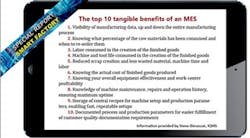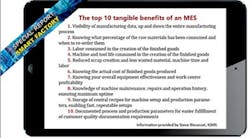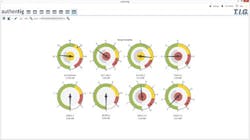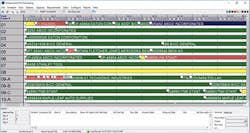Updated MES platforms handle complex plant operations
Managers of today's modern processing facilities have a slew of powerful tools at their disposal to help keep all of the machines, processes and people running smoothly. The most advanced and powerful of those tools is the manufacturing execution system (MES) — complex computer programs that monitor, manage and control the various elements of turning raw materials into finished goods.
"An MES is all about visibility for decision-making and manufacturing controls — the efficient use of materials, equipment and manpower," said Steve Bieszczat, CMO for IQMS Software, manufacturer of both MES and enterprise-resource planning (ERP) systems. "Manufacturers using MES see significant gains in profitability due to wise use of resources."
Due to the complexity and ever-changing nature of their products, software companies are constantly tweaking, upgrading and improving their systems. Some of the most recent offerings are highlighted below.
Syscon International
The origin of the PlantStar MES dates back nearly 40 years, when it was first developed for Tupperware by two professors from the Massachusetts Institute of Technology. Syscon International purchased it in 1986 and has been updating and improving it ever since, adding features and functionality as technology advanced.
During the first quarter of this year, the company will unveil its latest iteration: PlantStar 4.0, which is designed to collect and display data generated by workers, tools and machines.
"PlantStar will be installed in high-volume, cutting-edge factories that require material traceability; guidance of machines and operators; total productive maintenance (TPM); downstream applications such as assembly that include light-curtain and bar-code integration; and frequent push-and-pull from industry-leading ERP systems," said Gary Benedix, the company's VP of sales.
The newest update to the system:• makes PlantStar a completely browser-based application,• makes it usable on smart phones, tablets, PCs and monitors,• includes at-a-glance dashboard displays of machine- and plant-performance metrics and• offers flexible reporting, user-defined screen utilities, Kanban scheduling for just-in-time and lean manufacturing, quicker system-configuration utilities, and many user-defined free text fields.
Among the most powerful new features are PlantStar's data-collection modules (DCMs), which are industrial computers capable of digital, analog and serial connections that capture cycle signals from thermocouples, transducers and other sensory technology embedded in up to 16 machines simultaneously, Benedix said.
"PlantStar DCMs … can dispatch production units, securely store up to 20 shifts of data despite server failure and support automated and assisted decision-making at the edge of the shop-floor network," he said. "The expanded, event-based flexibility of the system makes it capable of monitoring any manufacturing operation ranging from injection, extrusion and blow molding, as well as metal stamping, decorating and assembly."
Benedix added that customers have told Syscon that they've been able to improve their overall equipment effectiveness (OEE) — used to measure the performance and efficiency of a manufacturing facility — by more than 13 percent across 100 machines in only three months. That improvement in efficiency is the equivalent of adding 13 more machines, or reducing manufacturing costs from $90 per hour to $70 per hour, he said.
PlantStar is available in three versions — SnapShot, Portrait and Panorama — depending on the size and complexity of the organization and its needs.
TIG
Technische Informationssysteme GmbH (TIG) knows a thing or two about what processors need from their systems, having developed one of the plastic industry's first MES in 1994. The company's newest offering, authentig, was first introduced to the U.S. market in 2015, but was just updated and re-launched in January. It can be hosted on-site but also is available as a web- or cloud-based solution.
Examples of the new features include:• the ability to see how a machine is set up on a computer, as well as compare the performance of different setups,• a logbook of all changes made to set values, capturing not only the date and time the changes were made, but also who made them,• the ability to display a large number of key performance indicators that can ensure machines are operating at peak efficiency,• a test client for the new Euromap 77 interface, which was created to ensure the exchange of data between injection molding machines and an MES, even if they come from different manufacturers.
"Authentig is a flexible system that can be configured for the specific needs of the customer," said Wolfgang Frohner, TIG's CEO. "Customers can choose from a dozen different modules to assist with everything from setup, monitoring, maintenance, quality, data analysis and more. The buyer can decide how many of them he wants to start with, then upgrade authentig with more modules as their needs change. The ability to start out with only the modules required at the beginning also makes implementation and training faster and easier."
Because authentig gives the user a full overview of production, it's easy to identify when a machine isn't functioning properly. That ability to optimize all equipment can reduce machine downtime by 15 percent and even decrease scrap rates by 5 percent.
In October 2016, Engel Austria GmbH, Schwertberg, acquired TIG, which operates as an independent subsidiary under the umbrella of the Engel Group.
IQMS
Like the other companies mentioned, IQMS has been in the MES game for quite some time. Its first MES products were introduced in mid-1990s as part of the company's end-to-end manufacturing ERP solution, although they weren't marketed as a stand-alone product until four years ago.
Recent functional enhancements include extremely finite scheduling for rotational molders and extruders, a more efficient user interface, and a rapid-recall and analysis tool set. "However just as important as the new functionality is our new Dell Boomi integration layer," Bieszczat said.
Dell Boomi is a multi-tenant, on-demand cloud platform designed to integrate on-site and cloud-based applications and data.
"The Dell Boomi strategy is to have the largest library of integration points in the industry, and make the interoperation between different software packages and OLE Process Control-Unfiled Control layers seamless and turnkey. We are a part of that strategy."
One of IQMS's key differentiators for its MES is the breadth of functionality it offers, as well as its ability to adapt non-manufacturing ERPs to the industrial environment.
"Some companies use it just for machine and process monitoring; others use it from the creation of work orders all the way to quality and finished goods management," Bieszczat said. "It really depends on which backbone ERP the customer is running. If they are running IQMS, then they use us end-to-end. If they are running an ERP that really isn't made for the manufacturing environment, they will use a lot of our manufacturing functionality to build out their manufacturing management environment."
IQMS went to great lengths to ensure that its MES worked for processors right out of the box, without the need for a lot of additional programming and customization.
Finally, the IQMS system operates in real-time. "That might be our most important differentiator of all," Bieszczat said. "Production data is flushed to the operators, and to the entire manufacturing environment, instantly. There are no batch processes — no delays."
Michael T. McCue, copy editor
For more information
IQMS,Paso Robles, Calif., 805-227-1122, www.iqms.com
Syscon International Inc.,South Bend, Ind., 574-232-3900, http://syscon-intl.com
Technische Informationssysteme GmbH,Rankweil, Austria, 43-5522-41693-0, www.tig-mes.com




